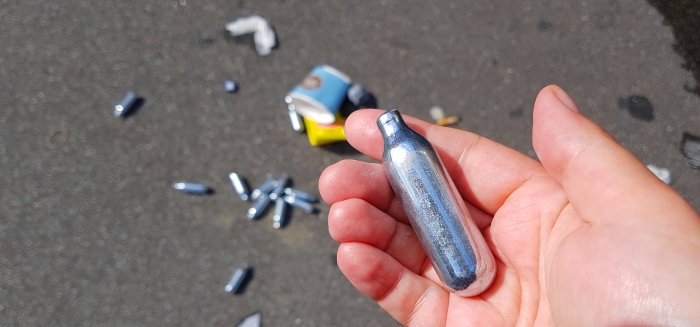Recreational use of laughing gas will be banned by the end of the year, Suella Braverman has announced as she declared the public was “fed up with yobs abusing drugs in public spaces”.
Those caught in possession of nitrous oxide face up to two years in jail or an unlimited fine.
There will be exemptions for legitimate uses of nitrous oxide such as for medical or catering industries.
The drug is currently regulated under the Psychoactive Substances Act, with a ban on its supply that carries a maximum penalty of seven years in jail.
This sanction will be doubled to 14 years under the changes being made by the Home Office as part of its “zero-tolerance approach to antisocial behaviour”.
Nitrous oxide will be classified as a Class C substance under the Misuse of Drugs Act 1971.
The ban was promised as part of the government’s antisocial behaviour action plan unveiled in March, but the timing had yet to be confirmed.

Braverman on Tuesday laid a parliamentary statute that must be debated and backed by both houses of parliament, although it is expected to be supported by comfortable majorities.
The home secretary said the crackdown on nitrous oxide was also designed to clean up streets in town centres that had become littered with the small silver canisters it is contained in.
Announcing the ban, Braverman said: “The British people are fed up with yobs abusing drugs in public spaces and leaving behind a disgraceful mess for others to clean up.
“Earlier this year the prime minister and I promised a zero-tolerance approach to antisocial behaviour and that is what we are delivering. If you are caught using laughing gas as a drug, you could be hit with a hefty fine or face jail time.
“New schemes are already under way to increase police patrols in hotspot areas of antisocial behaviour and dish out punishments for perpetrators more quickly, and police will soon be able to drug test people arrested for a wider range of illegal drugs.”
Recreational users release the gas into balloons then inhale it. The drug slows the brain and the body’s responses, with effects including feelings of euphoria, relaxation and calmness. It is known as laughing gas as it often causes giggling fits.

Prolonged use can cause vitamin B12 deficiency, anaemia and nerve damage.
Nitrous oxide has become the most commonly misused drug among 16 to 24-year-olds in England after cannabis. There are growing concerns about the health and social harms it poses, including paralysis or even death in extreme cases. It has become the third most-used drug after cannabis and cocaine.
Its popularity has grown because of the relative ease with which it can be obtained and the low cost compared with other substances.
Chris Philp, the policing minister, said the ban would reverse the belief among some young people that there were no consequences to misusing drugs.

“There is no question that abusing laughing gas is dangerous to people’s health and it is paramount we take decisive action before the situation gets worse,” he said.
“Not only are we making possession an offence for the first time, we are also doubling the maximum sentence for supply to 14 years, so the dealers profiting off this trade have no place to hide.”
Michael Kill, chief executive of the Night Time Industries Association, said that his members welcomed the ban, but that it must be accompanied with a broader education and harm reduction strategy on drugs across the country.
He said: “The government’s intervention comes at a pivotal juncture, given that businesses in major cities across the United Kingdom have witnessed a significant escalation in the challenges associated with nitrous oxide over the past six to 12 months.”
However, the move to ban the drug was opposed by the independent Advisory Council on the Misuse of Drugs, which advises the government on its drugs strategy. It said the level of health and social harm caused by nitrous oxide did not justify its inclusion under the act.
It warned that banning the drug could “produce significant burdens for legitimate medical, industrial, commercial and academic uses”.
The government will clarify which “legitimate reasons” would be exempt from the ban, such as chefs who use it in products including whipped cream or for freezing and chilling food. The gas can also be used for pain relief during childbirth or dental treatment.
The government is not expected to require legitimate users to obtain a licence after a consultation found that doing so would create unsustainable burdens on individuals and businesses who need the substance.
The crackdown on nitrous oxide comes after the Home Office changed the law to enable the police to test people on arrest for all Class A drugs, including ecstasy.
(Source: The Times)










